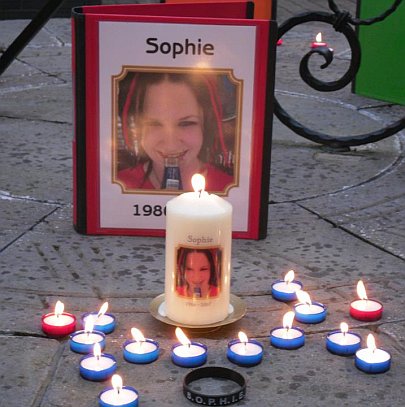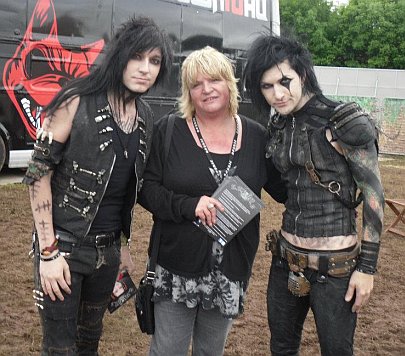
THE SOPHIE LANCASTER FOUNDATION – Somebodies
Anthony Morgan
September 2012
 |
![]()
While walking home during the early hours of August 11th, 2007, Sophie Lancaster and boyfriend Robert Maltby came across an entrance to a skate park. A number of teenage males were at the entrance in Stubbylee Park in Bacup, Rossendale in Lancashire, England, and proceeded to follow the pair. Without provocation, Robert was viciously attacked by the mob. Cradling him in her arms in an effort to protect him, the mob subsequently attacked Sophie.
“I’d gone out early that morning, and the police had pushed a card through my door,” Sylvia Lancaster remembers, mother of the late Sophie. “When I got home I picked the card up. I had a new mobile phone and I didn’t know how it worked, so I hadn’t bothered to take it out with me. I picked my phone up, and it had 40 messages from my son Adam. He told me that she’d been attacked.”
Sylvia wasn’t initially made aware of the seriousness of the attack. “It doesn’t quite work like that, I don’t think,” she muses. “I asked Adam ‘Where is she? Is she okay?’ He went ’Oh yeah Mum, she’s okay. She’s in intensive care.’ I thought ‘No Adam, she’s not okay if she’s in intensive care.’ It’s an odd thing, because you don’t think at first. It’s only when all the medicalization starts working when you think ‘This isn’t right.’ It’s a very odd situation, and very confusing.”
Sophie had been subject to abuse prior to the fatal incident. “It turns out that they’d been attacked three times prior to that attack,” Sylvia confirms. “She didn’t tell me about that and I don’t know why she didn’t.”
The perpetrators in question weren’t the same. The police didn’t take action however, because the incidents weren’t reported. “That’s part of the problem, isn’t it?,” Sylvia recognises. “People put up with that kind of abuse, because they think that’s a part of who they are. They don’t have to put up with that kind of abuse. If people don’t report, then the police are not aware of the situation. It does need reporting, and part of the work that we do at the Foundation is trying to get people to report incidents.”
Naturally, Sylvia hasn’t forgiven the perpetrators. “I would think that’s about right, really.”
When loved ones are taken away, some find religion in an attempt to seek comfort. “I’m not into religion,” Sylvia clarifies. “I can’t see that changing, but you never know, do you?”
Sylvia has a different outlook on subjects like God, nowadays. “It affects your outlook in lots of ways, actually,” she explains. “You don’t think about it, but yeah, it changes your values system. It changes lots of different things. I don’t like myself very much some days. You’re definitely not the same person at all.”
Such incidents change one’s thoughts on subjects like the death penalty, for example. “I used to think about it, but I don’t as much now,” Sylvia admits. “Obviously I think about that, but then it makes you no better than them, you know? That’s state murder rather than individual murder. I don’t know. I just think it’s a bit complex, that one. Obviously some days you’ll think that, and then other days you won’t. It’s very odd.”

|
Nonetheless, Sylvia is happy with the police’s response. “I have to say the police were amazing, absolutely brilliant,” she compliments. “They couldn’t have been more helpful, or more sympathetic. They were very, very good, actually.”
Following the tragedy, maintaining a positive outlook is difficult. “I was always positive really and that was quite easy for me because that’s the sort of person I am,” Sylvia reckons. “Now though I’ve gotta work at it sometimes, and I find it so frustrating. It’s frustrating some days, and very difficult. It does get easier though thankfully, but I don’t think it’ll ever go away.”
Sylvia was formerly an intensive advisor for young people aged 13-25. “I did lots of various things,” she adds. “I worked in high schools, and I worked with a local youth offending team. I worked quite a lot actually with youth offenders, drug abusers, alcoholics. It was difficult to help young people after what happened, but obviously I had to work. You can’t live on fresh air, can you? I couldn’t cope with it really though.”
August 24th, 2012 marked the fifth anniversary of Sophie’s passing. “I went to Sweden really to get out of the way,” Sylvia says of that date. “That was part of the reason for going. What happens sometimes is people forget about the private things because we’re so out there, and sometimes I don’t want to share things with other people. I just like to have my own space really, where I can think my own thoughts. It was nice really to be in Sweden though with people that I didn’t know really.”
Sadly, Sylvia isn’t in touch with Robert. “I think he’s slowly getting there though,” she offers.
Robert has an open invitation to become involved with The Sophie Lancaster Foundation, however. “Of course he could, yeah,” Sylvia affirms. “And it would actually be a pleasure.”
13 days following Sophie’s attack, the decision was taken to switch off life support. “It was very difficult, because as the days went on it became more and more obvious that she was never gonna survive,” Sylvia confesses. “The doctors said ‘She’s only young.’ They just didn’t want to switch those machines off actually, but eventually they realised that they had to do something. They did a brain stem test, and that tells them whether there’s any brain activity. Once it became obvious that there weren’t, then it was decided to switch the machines off.”
Sylvia describes Sophie as “quite a solitary person, in reality. She liked nothing better than curling up on the settee with a bottle of coke, a bar of chocolate, and a good book. That’s my biding memory of her really, and yet when she was out with her mates she could be quite the life of the party. And she was so funny – she had a good sense of humour.”
Marilyn Manson, Cradle Of Filth, Evanescence, and Emilie Autumn were among the artists she enjoyed. “She liked quite a wide range of music, really,” Sylvia recalls. “She was just into the music, and films. She liked films. Buffy The Vampire Slayer was out when she was young, and she loved that – that type of thing. The Crow (1994) was her favourite film, I think.”
The Sophie Lancaster Foundation was launched following Sophie’s passing. “Really, I started thinking about setting up a Foundation before Sophie was attacked,” Sylvia reveals. “It’s really a bit odd. I had actually spoken to Sophie on the Thursday, and they were attacked on the Friday. I decided to do something in reality before she was attacked, so that sort of set it off while they were still in hospital really. My friend who was with me came up with a campaign. The initial idea was for Sophie to come with me to local youth clubs, and just let young people talk to her. The reality is that’s what would’ve happened, so that’s the form it would’ve taken.

|
“I came to a realisation that young people and older people who look different or belong to alternative subcultures really put up with a lot of abuse and prejudice that I personally felt they didn’t need to. Because I’ve always worked really in equality and diversity I just thought I’d do something about it, and then obviously Sophie’s attack gave me the catalyst really to do something.”
The Sophie Lancaster Foundation has three main aims and objectives. “Our three main aims and objectives are to create a lasting legacy for Sophie, to change the hate crime legislation in the UK and have alternative lifestyle and dress code as a separate strand under hate crime legislation, and thirdly is education,” Sylvia details. “Education is going to schools, youth clubs, universities, prisons. Taking our educational resources to these places, telling them the story of what happened to Sophie and about discrimination of those with alternative lifestyles and dress code. That’s the form it’s taken really over the last couple of years.”
The Foundation’s educational workshops involve a variety of activities. “If it’s group work, what we have is an interactive game and it’s really very simple,” Sylvia expresses. “It is a two-way process though, and not just one-way. We really take the lead off of what young people say. It takes different forms, actually. Sometimes we get down on the floor with the young people with rolls of wallpaper, and get them to write what they think about alternative. Other times we just give them cards to write down the names of public figures they’d like to spend time with, or alternatively they wouldn’t like to spend time with. It depends obviously on what they say really as to which form that will take.”
Do attendees meet an alternatively dressed individual at one of these workshops, Sylvia? “We have a girl who works with us – Stacey (Elder) – and she’s alternative, although I have to say she doesn’t go into schools or wherever dressed alternatively herself. When she’s suited and booted, she’s a Victorian goth. If they see her alternatively dressed, then we’ll talk to them about that aspect as well. It all depends really. It’s more led by the young people than led by us.”
Certain members of the public have a fear or dislike of alternatively dressed individuals, unfortunately. “Young people see somebody and they think they’re different than themselves, but in reality they’re not,” Sylvia stresses. “I think that that’s a lot to do with it, and academics now are beginning to look at that aspect which is quite interesting – that fear of difference, fear of other really. I explain to young people that just because somebody dresses differently doesn’t mean that actually underneath that they’re not the same as them, because actually in many cases they are. It’s getting that message across to young people, really. Rather than being frightened of difference, we should be celebrating difference.”
The attitudes of young people could perhaps be reflective of the parents’ attitudes, and be passed down from generation to generation. “I would think so, yeah, but I think a lot of it is peer pressure and it’s the media as well I think,” Sylvia notes. “The media doesn’t help in many cases. We recently had a shooting in America (August 27th), and the media automatically drifted towards to the fact that the shooter (Bobby Gladden) listens to Rammstein. Hold on a minute; what’s that got to do with anything? It doesn’t help, does it? Really, I think it’s a lot of different factors. It’s a very complex subject, actually.”
Perhaps some of those who discriminate alternatively dressed individuals come from troubled backgrounds? “I don’t know – I don’t know the answer to that,” Sylvia concedes. “The reality is just because someone comes from a troubled background, that doesn’t give them the right or make it okay. There are a lot of people with troubled backgrounds who don’t do things like that.”

|
Sylvia feels the Foundation’s educational workshops have had “had quite a big success. It’s surprised me, I’ve got to tell you. I didn’t realise it would have the impact that it does, and obviously we’ve got Sophie: A Dark Angel (2009) which always helps. It’s an animation, and we use that as well. That just has a dramatic effect on young people, as you can imagine. It helps young people build an empathy and I think sometimes young people perhaps lack that, a bit of an empathy towards other people. I think what it also does is it puts them right at the centre of things, and I think they see how that can affect other people. I think that’s probably the major difference it makes.”
As Sylvia stated, the Foundation is lobbying UK parliament to legislate that discriminating someone based on their alternative dress is a hate crime. “It all started really before Sophie was attacked,” she reiterates. “One of the benefits of the job I had was that we had a bit of training about hate crime, and we were also a third party reporting centre. I just remember sitting there looking at the criteria that they use for different strands, and thinking ‘Goths come under that.’ You’ve got to have certain beliefs and values, which they do. I just remember sitting there and thinking ‘That’s an interesting one.’ When Sophie came to be attacked, the very first thing I asked is ‘Are you going to classify this as a hate crime?’ To me, that’s exactly what it was. It’s the same as being racist. It’s the same as being prejudiced against someone because they’re gay, or whatever. It’s exactly the same – it is no different. That really started the ball rolling.
“Whitby Gothic Weekend got involved, and really that was the start of it. I then went to see the Secretary Of State For Justice Jack Straw, and he gave us some good pointers actually. It went from there, really. He called for tougher sentences on those who commit hate crimes against people from alternative cultures. Once he said that it set a precedent, and it gave us a platform to work from. That’s been quite an interesting journey, actually. We then had Lynne Featherstone (Liberal Democrat MP for Hornsey and Wood Green) stand up a couple of months ago, and say that the government sees and accepts that discriminating someone based on their lifestyle and dress code is a hate crime. We are getting there, and we are making a lot of noise really in that area.”
The UK government shares the Foundation’s stance. “There’s no issue about it actually at all, which was not expected as you can imagine,” Sylvia enthuses. “Five years on – as Lynne Featherstone said – they accept that what we’re saying is right, the problem being…. And I understand this, so it isn’t that I don’t understand. They say if you put lifestyle and dress code into legislation, it would cause a lot of problems in court. Let’s be honest: barristers are so clever, and they can use that in lots of different ways. My argument though is if they’ve got brains and better brains than me, then they can differentiate between what is and isn’t a hate crime. I think they need to look at that really, but in all honesty there is no argument.”
The Foundation works alongside the UK police. “Very closely, actually,” Sylvia divulges. “We were invited by Chief Superintendent Paul Symes to speak at the national Superintendents’ Conference (in Warwickshire, England on September 12th). In March (2012) I went to speak in Gwent at the National Association of Chief Police Officers conference, and he heard me speak there. The police have given us massive backing, actually. They’ve been fabulous; they back everything that we do. We work closely with them.”
Police officers possibly don’t know how to deal with incidents involving prejudice towards those with alternative lifestyles, and perhaps have wrong ideas about those from alternative lifestyles. “Oh, I agree with you,” Sylvia acknowledges. “The police accept that, and they know that. They’re very much aware that they need to work on that issue, which is why they’re working closely with us. They do know.”
The heavy metal community has lent great support to the Foundation. “Oh, absolutely amazing,” Sylvia praises. “It’s just been unbelievable, really. We went to Bloodstock Festival (in Derbyshire, England, August 9th-12th) recently, and it was just something else. The support that they give us is phenomenal, and the week before that we had been at Rebellion Festival (in Blackpool, England, August 2nd-5th). The punks as well give us support, and the the goths. It’s been amazing, and a real eye-opener. I think what’s happening is we have a massive faithful, and it’s about the communities themselves coming together and standing up to say ‘Actually, we’re not putting up with it any longer.’ I think that’s just incredible.”
The aims of The Sophie Lancaster Foundation are British in scope at the moment, but there is the possibility that the Foundation’s aims will become more international. “I’d like that to happen, yeah, definitely,” Sylvia reveals. “I’ve been over to Sweden recently, and went to a goth festival (Sunset Park Festival, August 24-25th) in Umeå, Sweden. From that we’ve been invited to a goth festival (Wave-Gotik-Treffen, May 17th-20th 2013) in Leipzig, Germany. Hopefully we’re making inroads, and we have actually been working with Romanians for a couple of years now – they’ve got a campaign in Romania. We have been working internationally, and hopefully that will spread. Obviously we’ve been spending our time doing the best we can really in the UK, putting strong Foundations down here really first.”
Aired on BBC Radio 4 during March 2012, Black Roses: The Killing Of Sophie Lancaster was originally a radio play featuring poems authored by Simon Armitage, the tragic story told from the words of Sylvia by Rachel Austin. “We actually won the BBC Audio And Music Best Speech Programme Of The Year Award, and now it’s actually been turned into a theatre play,” Sylvia augments. “That was shown at the Royal Exchange in Manchester from September 19th-26th. I spoke to the director, and she told me that it was sold out. It had a lot of press interest. I think it might be taken to London, so that’s amazing really. Julie Hesmondhalgh who plays Hayley Cropper in Coronation Street took my role, and Rachel Austin who voiced Sophie in the radio production played Sophie. There was only be two of them onstage.
“We had a presence there every night. We had a stall, and sold merchandise. We did a question and answer session as well on one night.”
The Sophie Lancaster Foundation has future plans, inevitably. “We’ve just put together a big funding bid with an organisation based in Leeds, and we hope to get a helpline set up for alternative people which would operate 24 hours a day,” Sylvia imparts. “That’s our next big one. In another five to ten years time, I would like the Foundation to have its own training providers where young people who’ve been excluded from school or can’t get a job can come along and we’d given them basic maths training, NVQ training, and that kind of thing. I would probably like to be involved in that.”
To date, the Foundation doesn’t work with UK employers. “Perhaps that might be our next one to look at,” Sylvia ponders. I think that might be a good idea.”
Employers sometimes discriminate against alternatively lifestyled individuals, such as those who sport tattoos. “Absolutely,” Sylvia agrees. “We do get people coming onto us and saying that actually, that they are being discriminated against. We’re working with a young girl, and she wanted to be a shop assistant. She had just one lip piercing, and I remember ringing a few departments for her in Manchester. None of them would interview her unless she took her piercing out, so we’re quite aware of that issue.”
August 24th, 2012 marked the fifth anniversary of Sophie Lancaster’s passing. Further information regarding The Sophie Lancaster Foundation can be found via the organisation’s website.
Interview published in September 2012.
Related Posts via Categories
- SCOTTISH SICKNESS – A Report On The Scottish Death Metal Scene, Featuring BRAINBATH, PUTRID FATE And RANCID CADAVER (October 2022) | Features / Interviews @ Metal Forces
- LARVAE – Join The Hardcore Cult! (June 2022) | Features / Interviews @ Metal Forces Magazine
- TRENCH FOOT – Sacrificing Morals For Gory Obscenities (June 2022) | Features / Interviews @ Metal Forces Magazine
- L.A. GUNS – Trigger Happy (March 2019) | Features / Interviews @ Metal Forces Magazine
- CANCER – Crimes So Evil (November 2018) | Features / Interviews @ Metal Forces Magazine
- U.D.O. – The Tank Drives On (August 2018) | Features / Interviews @ Metal Forces Magazine
- SIEGE OF POWER – Bleeding For The Cause (August 2018) | Features / Interviews @ Metal Forces Magazine
- MOONSPELL – A Taste Of Live Eternity (August 2018) | Features / Interviews @ Metal Forces Magazine
- MONSTROSITY – Dark Matter Invocation (August 2018) | Features / Interviews @ Metal Forces Magazine
- SATAN – Five Magicians (August 2018) | Features / Interviews @ Metal Forces Magazine
|
|





